Amaranth, huacatay: a farm with sabor
An Ecuadorian immigrant creates a grounding space for the queer community
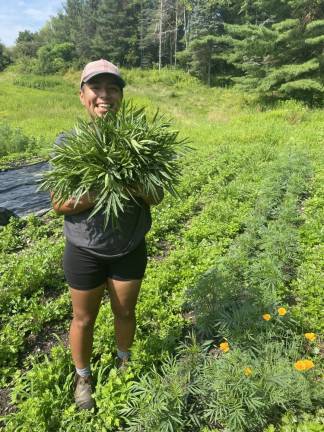
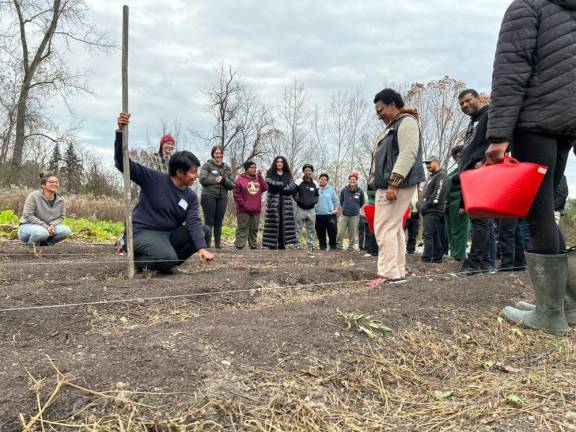
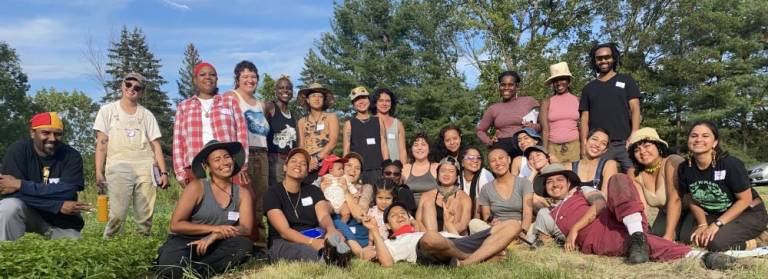
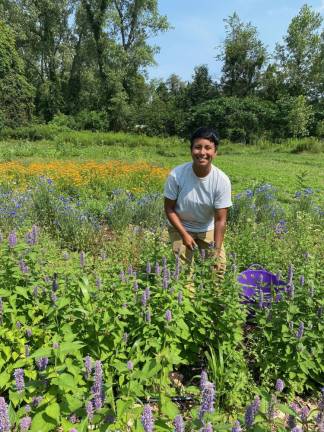
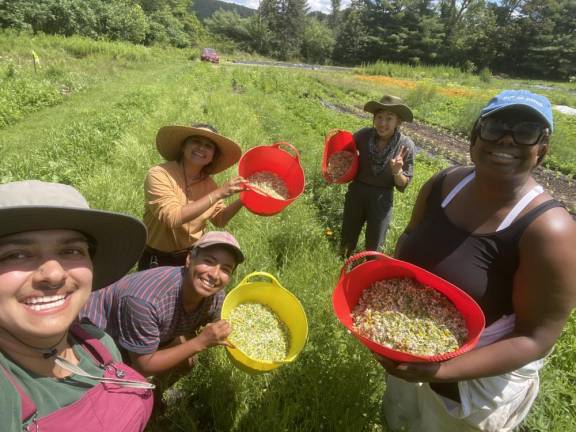
Amara Ullauri has a very clear memory of coming to the United States from Ecuador at the age of five. “It was August 1996,” recalls Ullauri as we catch up, late one hot August afternoon. As I sip on a cooling stinging nettle tea from my garden, Ullauri tells me about the Andean drink horchata, a daily tonic made of 20 different healing herbs and flowers. Talk about local: the recipe for horchata will differ depending on what region of the Andes you’re in.
I have a very clear memory of meeting Ullauri in a farm business class in New York City — it was 2018, and the first time I’d heard someone using a “they/them” pronoun. Ullauri’s soft, gentle voice was paired with a firm sense of who they are and what they wanted — a queer Andean earth steward who dreamed of starting a healing herb farm. And in 2021, that dream manifested as Ayni Herb Farm in Hillsdale, NY. In Kichwa, the native language spoken in southern Ecuador, Ayni (eye-knee) is a principle that translates as “reciprocity.”
“I grew up drinking that with my grandma and the amaranth gave the horchata, like a really beautiful fuchsia color,” said Ullauri. But not just any amaranth seeds; Ullauri is using seeds from their homeland to welcome amaranth onto the new farm — a reminder of their ancestors’ guidance and protection. “No matter where I go, I try to grow amaranth,” they said.
Amaranth is actually in the beet/chard/spinach family (not a grain, as commonly understood), and while it grows well in the Andean region where it’s considered a staple food of indigenous peoples, cultivation was banned in the 16th century by conquistadors. Amaranth was considered sacred, and the colonizers feared the spiritual connection with the plant would curtail the spread of Catholicism. Suddenly planting amaranth took on a whole new meaning.
The notion of food as sacred evolved for Ullauri as they began farming in New York City around 2015, working with small-scale, grant-funded farms in Brooklyn on no more than a third of an acre. “I relied a lot on that medicine to support me through many seasons of farmer burnout, but also to support the students that I was working with,” they said. “There’s just so many different kinds of needs in our community, like the need for finding safety and grounding and belonging. And so amongst all the vegetables and things that we were growing, I always found a way to grow a little bit of medicine.”
The luxury of slowing down simply wasn’t possible in New York. Even when Ullauri wasn’t farming, they were working a restaurant job to make the proverbial ends meet. And in this case, the hustle didn’t come with a flow. Instead, it compounded Ullauri’s desire to re-energize their relationship with land and the way they worked. “I really felt that urge to literally shift my physical settings in order to align,” said Ullauri.
With that urge came an opportunity in the spring of 2020: to work at Rock Steady Farm in Millerton, NY — a 12-acre queer-owned and operated cooperative vegetable farm that jived with Ullauri’s food and social justice values.
“Despite feeling sadness to leave my community during a really intense time, I was really happy to land at a farm where I knew the food that I was growing was literally going into the same neighborhoods where friends and neighbors were getting access,” said Ullauri.
It was this tethering to community that led Ullauri to lease a small plot of land at Rock Steady Farm to pilot an herb farm cooperative. And when, due to a number of life and pandemic pressures, the cooperative didn’t fully take off, Ullauri looked inward, telling themself: You’ve been farming for a long time. Yeah, you have the skills, you have the community support, you have so many folks, like, rooting for you. Let’s figure out how to do this.’
“And I think organically things just happened,” they said. “I think just like keeping my eyes, ears and heart open has led me to the farm where I’m at now.”
This past fall marked Ullauri’s third season on the farm, celebrated with an annual community garlic planting festival. For Ullauri, garlic planting takes on special meaning — one of commitment to the land, to show up again the next year.
Accessibility is an important part of Ullauri’s work, and so in addition to a fresh herb CSA that includes sovereignty shares, they offer sliding scale pick-your-own.
Ullauri’s clarity of vision has centered on creating a healing space for queer and trans people to connect with the land. “I’ve really appreciated the times where I’ve been able to be surrounded by cornstalks and sunflowers and ramps and chamomile and mints. And, you know, just have a full sensory experience that has brought a lot of healing to my body. Folks have the opportunity to come to the farm and experience being around the plant medicine. I think that adds to the healing properties of the plants themselves,” they said.
“For me, the question continues to be, how do we build sanctuary for queer and trans people, and grounding and belonging in a society that tells us we shouldn’t exist?”